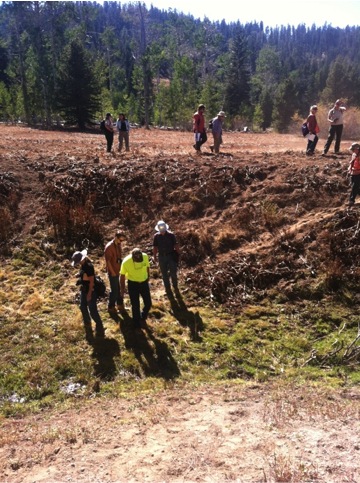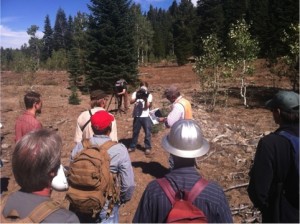CSERC joins with ACCG group in their efforts to use collaboration to create healthier forests and watersheds
The Amador-Calaveras Consensus Group (ACCG) formed six years ago as a collaborative partnership of activist groups, public land and government agencies, and local businesses to “create fire-safe communities, healthy forests and watersheds, and sustainable local economies.” The ACCG efforts focus on the private and public lands of Amador and Calaveras counties, with a major emphasis on forest restoration projects in the Stanislaus and El Dorado National Forests. ACCG successfully received special congressional grant funding for the “Cornerstone Project.” All projects funded through the ACCG must have consensus agreement from all the different members of the Group, making the end result a truly collaborative effort.
 Until earlier this year, our Center had been supportive of ACCG, but we’d remained mostly uninvolved since the majority of the projects they’d focused on had been low controversy fuel reduction actions. But when the ACCG began planning a major meadow restoration project at Mattley Meadow, the Group reached out to us for input. CSERC staff joined ACCG members on a daylong field session out to Mattley, where we discussed a range of restoration alternatives that could be carried out at this large meadow.
Until earlier this year, our Center had been supportive of ACCG, but we’d remained mostly uninvolved since the majority of the projects they’d focused on had been low controversy fuel reduction actions. But when the ACCG began planning a major meadow restoration project at Mattley Meadow, the Group reached out to us for input. CSERC staff joined ACCG members on a daylong field session out to Mattley, where we discussed a range of restoration alternatives that could be carried out at this large meadow.
On this field session our staff also learned more about a new proposed 13,000-acre forest restoration plan (the Hemlock Landscape Restoration Project) that the Calaveras District is planning and hopes to carry out with the support of ACCG funding. The Hemlock Project proposes forest thinning, fuels reduction, wildlife restoration, wetland and riparian restoration, scenic bypass enhancement, and much more. The challenge with these and other highly positive forest restoration treatments is that it takes either “extra” federal dollars or some other major funding source to get the work done. That’s why there is high value in showing that environmentalists, politicians, range interests, logging interests, and others can all collaboratively agree on the value of a proposed action.
 It is not possible for CSERC staff to be involved in every imaginable conservation issue or opportunity that comes up in our region. We are already deeply engaged in two other regional collaborative group processes. But because ACCG is appropriately balanced and now plans to pursue major projects, our staff agreed that it made strong sense to formally join the ACCG and become a more active participant in the group. We will keep you updated about relevant and important project news that develops as we work with the private citizens and agency specialists who are leading ACCG as it plans important upcoming projects.
It is not possible for CSERC staff to be involved in every imaginable conservation issue or opportunity that comes up in our region. We are already deeply engaged in two other regional collaborative group processes. But because ACCG is appropriately balanced and now plans to pursue major projects, our staff agreed that it made strong sense to formally join the ACCG and become a more active participant in the group. We will keep you updated about relevant and important project news that develops as we work with the private citizens and agency specialists who are leading ACCG as it plans important upcoming projects.

